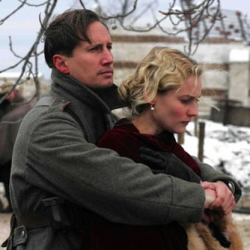Mark:
‘Based on real life events’ doesn’t often mean much to this reviewer – too often those words are (ab)used in a cynical attempt to lend credibility to a story otherwise struggling to maintain it. In the case of Joyeux Noël (Merry Christmas, Feliz Navidad), however, the knowledge that similar events as these truly occurred in the trenches in World War I serves to make it even more moving.
 Following the triple thread of the Scottish, French and German frontline troops as they struggled through their first Christmas of the War, Joyeux Noël tells the remarkable story of the Christmas Eve ceasefire of 1914, when the warring parties came to agreement, put down arms, enjoyed a meal and some champagne together, and in doing so broke down the myths of war. They realised that their ‘enemies’ were just like themselves, and the hollow preaching of their superiors and governments could not change that fundamental fact.
Following the triple thread of the Scottish, French and German frontline troops as they struggled through their first Christmas of the War, Joyeux Noël tells the remarkable story of the Christmas Eve ceasefire of 1914, when the warring parties came to agreement, put down arms, enjoyed a meal and some champagne together, and in doing so broke down the myths of war. They realised that their ‘enemies’ were just like themselves, and the hollow preaching of their superiors and governments could not change that fundamental fact.
Made in cooperation between the three European nations depicted, the film itself carries a powerful anti-war message, and it’s not hard to see at whom this may be directed in the current climate. Containing depictions of the use of propaganda and demonisation as motivation to commit acts not otherwise conceivable, and the abuse of the status of religion by those supposed to protect its precepts, it firmly criticises those who justify conflict on religious and fear-based grounds. The men learn the truth of the world, they see behind the curtains, and their refusal to betray their new-found knowledge leads to the most humane behaviour of the film – starkly contrasted with that of their ‘leaders’.
The avoidance of outright or overtly manipulative sentimentality, while allowing the tale to tell itself – there is no question that at its heart it is sentimental in nature – is one of the strongest points in its favour, and is more impressive given this is only the second feature film for director Christian Carion. It would be hard not to be moved to some feeling of Christmas cheer, seeing these men risk everything to experience an element of normality in a world that has fallen apart for each of them, and their longing for an emotional escape from their trenches to another time and place shames those of us who find Christmas only to be a commercial venture with too much food and drink.
Joyeux Noël is a little long, and certainly much of the subplot between Diane Kruger and Benno Fürmann could have been trimmed – in fact, it was hard to accept Kruger’s role in this piece at all, her presence an incongruity that consistently jarred. The impact of the final sequences may have been increased by more punchy direction, although there is no question that the response of the Army superiors and Goverment officials to the actions of their men carries one of the most important points to be made.
That this is a sentimental story told in a mildly sentimental way should not diminish the power of these events. That it makes comment on the actions of the powerful of today, while still telling a simple but moving tale of yesterday, gives an intellectual depth to the emotional heart. Highly recommended.
Rating: